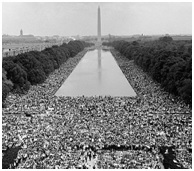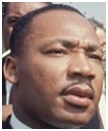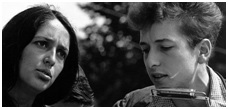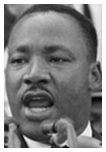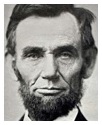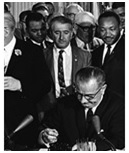|
 |
|
 |
The March on Washington - Empowerment and Civil Rights
The March on Washington (1963)
Famous for...
1.The march on 28th August 1963 Over 200,000 African and white Americans in Washington DC, USA marched from:
It was a peaceful demonstration in support of the civil rights movement This wanted to end racial discrimination, rooted in slavery and white bigotry (particularly in the southern states that fought for slavery in the American Civil War, 1861-5). 2. Martin Luther King's speech King led the march (pictured right taking part). His ‘I have a dream’ speech was inspirational - see below.
3. Music and the spirit of the sixties Protesters were entertained by songs from folk singers:
People’s fight for a better world was summed up by two songs:
Why was the march successful? 1. Martin Luther King’s ‘I have a dream’ speech (pictured right) Considered one of the greatest ever speeches, it powerfully uses repetition of its three key phrases:
a) “Now is the time” Repeated three times, including: “Now is the time to lift our nation from the quicksands of racial injustice to the solid rock of brotherhood”.
b) “I have a dream” Repeated eight times including: “I have a dream that my four children will one day live in a nation where they will not be judged by the colour of their skin but by the content of their character”.
c) “Let freedom ring” Repeated ten times leading to the speech’s tremendous ending: And when this happens, when we allow freedom to ring, when we let it ring from every village and every hamlet, from every state and every city, we will be able to speed up that day when all of God's children, black men and white men, Jews and Gentiles, Protestants and Catholics, will be able to join hands and sing in the words of the old negro spiritual, ‘Free at last! Free at last! Thank God Almighty, we are free at last!’.
2. Universal appeal King’s speech referred to:
He did this to appeal to all Americans, white as well as black.
3. Non-violence King’s message was more effective because the march was peaceful, following his philosophy of non-violent protest.
4. Government support President John F. Kennedy (pictured right) had been won over by:
Kennedy was assassinated in November 1963. But his successor, Lyndon B. Johnson:
5. Justice The blacks had right on their side. They were:
In 1960 blacks earned only a half as much as whites and were twice as likely to be unemployed.
Key events before the march
1863 The Emancipation Proclamation - Abraham Lincoln (pictured right) declares that all slaves are free.
1866 Ku Klux Klan (a murderous white racist group) formed (pictured right in 1922).
1896 Plessy v. Ferguson – a Supreme Court decision supporting racial segregation. This was reinforced by the racist and segregationist Jim Crow laws in the southern states.
1909 The National Association for the Advancement of Coloured People (NAACP) formed.
1931 Five black youths (the Scottsboro Boys) are wrongly convicted of rape.
1946 Jackie Robinson (pictured right) becomes the first black professional baseball player (pictured right).
1954 Brown v. Board of Education – a Supreme Court decision that made school segregation illegal.
1955 (August) A black 14-year-old boy, Emmett Till (pictured right), is brutally murdered by two white men who are acquitted by an all white jury.
1955 (December) Rosa Parks refuses to give up her bus seat, leading to the successful year long bus boycott by blacks in Birmingham, Alabama, led by Martin Luther King.
1963 (April) Martin Luther King writes his famous Letter from Birmingham Jail, explaining his vision of achieving racial equality through non-violent civil resistance. “One has a moral responsibility to disobey unjust laws”, he says.
Key events after the march
1963 (September 15) A Ku Klux Klan member throws a bomb into a Baptist church in Birmingham, Alabama, killing four and injuring 21 black children. At the girls' funeral, Martin Luther King was right, when he said: “The innocent blood of these little girls may well serve as a redemptive force that will bring new light to this dark city”. Today the lives of Birmingham's African Americans have been transformed.
1964 Civil Rights Act bans racial discrimination (President Lyndon B. Johnson is pictured right signing the Act with Martin Luther King behind on the right)
1965 The African American leader, Malcolm X, is assassinated.
1968 Martin Luther King is assassinated. 2009 Barack Obama becomes the first black president (pictured right at his inauguration).
Civil rights heroes
Martin Luther King (1929-68) Inspirational supporter of non-violent action – see above.
Ralph Abernathy (1926-90) King’s best friend and helper (pictured right).
Malcolm X (1925-65) African American leader (pictured right) who supported black rebellion (“by any means possible”, he said) and so refused to take part in the Washington March. He joined a militant Islamic group, the Nation of Islam (also supported by the boxer, Muhammad Ali). But, just before he was assassinated, he sought non-violent reconciliation with whites after a pilgrimage to Mecca.
Lyndon B. Johnson (1908-73) American president (pictured right) who passed the civil rights legislation that gave blacks equal rights (also supported by his predecessor John F. Kennedy).
Rosa Parks (1913-2005) Black seamstress ,pictured right in 1955, who sparked off the bus boycott in Birmingham, Alabama, by refusing to give up her bus seat to a white passenger.
Fannie Lou Hamer (1917-77) Despite an almost fatal beating by police in 1963, Hamer (pictured right) bravely campaigned for:
Abraham Lincoln (1809-65) The American president who fought the American Civil War to free the slaves. This freedom was given by the Emancipation Proclamation in 1863.
Frederick Douglass (1818-95) A freed slave (pictured right) who fought for the abolition of slavery along with other abolitionists like William Lloyd Garrison.
Booker T. Washington (1815-1926) Black leader (pictured right) who fought tirelessly to end racial discrimination.
W.E.B. Du Bois (1868- 1963) Booker T. Washington’s opponent (pictured right) who believed that blacks should be more aggressive in their fight for equality. He died a day before the Washington March.
Key quotes (by Martin Luther King)
Now is the time. (part of King’s ‘I have a dream’ speech that became the rallying cry of the civil rights movement).
Unarmed truth and unconditional love will have the final word.
There comes a time when people get tired of being trampled over by the iron feet of oppression (supporting the bus boycott).
Other key quotes
Our objective is complete freedom, justice and equality by any means necessary. - Malcolm X.
I am sick and tired of being sick and tired. - Fannie Lou Hamer.
A house divided against itself cannot stand. I believe this government cannot endure, permanently, half slave and half free.
Civil rights music
We Shall Overcome Sung by the American folk singer, Joan Baez, at the Washington March that became the unofficial anthem of the civil rights movement. Show Boat This musical deals with racism and slavery, including its famous song, Ol’ Man River, sung by the black civil rights activist, Paul Robeson (pictured right).
Best civil rights films
a) To Kill A Mockingbird (1962) The film version of Harper Lee’s book. b) In the Heat of the Night (1967) The film starred Sidney Poitier, the first black movie star (pictured right). He plays a black policeman who has to cope with his racist colleague (Rod Steiger, also a star of Dr. Zhivago).
Best civil rights novels
1. Harriet Beecher Stowe (pictured right) , Uncle Tom's Cabin (1852) This helped to start the American Civil War.
2. Harper Lee (pictured right), To Kill A Mockingbird (1960) 3. Mildred Taylor (pictured right), Roll of Thunder, Hear My Cry (1976)
|
|
|
||
|
|
|
||
|
||
| Copyright © wisdomtowin.com All Rights Reserved | ||
|

